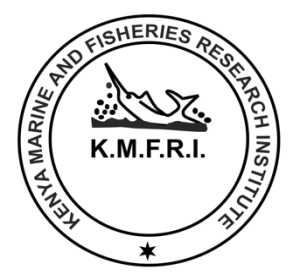Kenya Marine and Fisheries Research Institute (KMFRI) is a State Corporation established in 1979 by the Science and Technology Act, Cap 250 of the Laws of Kenya, which has since been repealed by the Science, Technology, and Innovation Act No. 28 of 2013 which has recognized KMFRI as a national research institution under section 56, fourth schedule. KMFRI's mandate is to research "marine and freshwater fisheries, aquaculture, environmental and ecological studies, and marine research including chemical and physical oceanography", to provide scientific data and information for sustainable development of the Blue Economy.
Vision
A Centre of Excellence in innovative research in marine, fisheries for Blue Economy Development
Action
Development of Technologies for Improving Productivity of Aquaculture in Kenya.
The roles of KMFRI according to Legal Notice No. 7 of 1979 are to:
- Conduct multidisciplinary and collaborative
research on fish ecology, population dynamics, stock assessment, and
general aquatic ecology;
- Collect and disseminate scientific information
on fisheries and other aquatic resources and related natural products;
- Study and identify suitable species for
culture including development, adoption, and transfer of rearing
technology and procedure;
- Study chemical and physical processes that
affect the productivity of aquatic ecosystems;
- Monitor water quality and pollution in fresh
and marine water environments;
- Carry out socio-economic research on aspects
relevant to fisheries, environment, and other aquatic resources;
- Establish a marine and freshwater collection
for research and training purposes;
- Offer training facilities to aquatic
scientists;
- Research fish quality control, post-harvest
preservation, and value-addition technologies and Research blue
economy
- Conduct multidisciplinary and collaborative
research on fish ecology, population dynamics, stock assessment, and
general aquatic ecology;
KMFRI signed a grant contract
with KALRO as a Co-applicant to implement the project entitled “Development of
Technologies for Improving Productivity of Aquaculture in Kenya” under the
AgriFi Kenya CS APP Result area 1. (a): New drought-resistant and more yielding
climate-smart technologies developed. The focus is to address specific
productivity constraints, facing farmers and whose solution will unlock farmer
integration in commodity markets. To achieve the overall goal, the following
specific objectives aim to be achieved:
1.
To develop low-cost and high-quality feeds for fish
2.
To develop and
avail High-quality broodstock and fingerlings for Nile tilapia and Catfish to
farmers
3.
To multiply and
domesticate Indigenous fish species to boost aquaculture and eventually restock
their native environment domesticated and multiplied
4.
To develop and
disseminate information on smart climate-smart aquaculture technology

